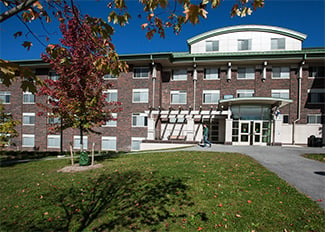Learn the history of the building's name

Ashokan Hall is a suite-style residence hall in the Peregrine Complex, constructed in 1968 and renovated in 2011. Suites in each of the Peregrine Complex halls consist of two to four double occupancy bedrooms, a common bath and a small lounge area.
Students who live in the suites enjoy the privacy of their own "living room" and can personalize it (along with their individual rooms) with posters, plants, rugs and furniture. Residents are responsible for maintaining and cleaning their own bathrooms.
Common areas feature modern furnishings and decor that provide students with a comfortable space to study or relax with friends.
In the basement of Ashokan Hall are a laundry room with washers and dryers that are free to use for all residents, a TV lounge, a bike storage room, a recycling room, a study lounge, computer lounge, and a kitchen equipped with an oven, stove top, and microwave. Located on the first floor are vending machines, student mailboxes, and public restrooms.
Ashokan Hall is in close proximity to a campus computer lab, Peregrine Dining Hall, and the Student Union Building. Ashokan Hall seeks to provide its diverse students with academic, cultural, educational and social programs to enhance living and learning experiences outside of the classroom.
As a 10-month hall, Ashokan is open during all scheduled vacations (unless otherwise indicated by the Director of Residence Life) to permit students needing housing to remain on campus when other halls are closed. Students must already live in 10-month housing to stay over breaks.
What’s in a Building Name?
Ashokan Hall shares a name with the Ashokan Center, a conference and retreat center in the Catskill Mountains, which was formerly part of SUNY New Paltz then known as the Ashokan Field Campus.
Ashokan is also the name of the nearby reservoir, a major water supply for New York City and the Village of New Paltz. The word “Ashokan” is believed to derive from an Iroquois word and is often translated as “place of many fishes.”
From 1968-2019, the building was named Crispell Hall after Antoine Crispell, an original patentee of New Paltz who settled in this region along with other original Huguenot patentees during the 17th century.
Early generations of the Crispell family, including Antoine Crispell, owned enslaved Africans prior to the 1828 emancipation in New York State. During the Civil War, many Crispell family members fought with the Union Army, including Abraham Eltinge Crispell, who served as Brigade Surgeon of Volunteers beginning in 1862.
Subsequent generations of the Crispell family demonstrated strong commitment to education and contributed to founding, governing and supporting the schools that would eventually become SUNY New Paltz.
The SUNY New Paltz College Council and the SUNY Board of Trustees voted to change the name of this and five other buildings in the Peregrine Complex in 2019, following nearly two years of research and inclusive dialogue initiated by President Donald P. Christian and led by the Diversity & Inclusion Council.
The process involved a broad constituency of students, faculty, staff, alumni, the College Council, campus leadership, and community stakeholders, including Huguenot descendants and Historic Huguenot Street leadership.
The Diversity & Inclusion Council ultimately recommended that changing the building names would position the College to better serve the needs of an increasingly diverse student population. President Christian supported this recommendation and advocated strongly for its approval by the College Council and Board of Trustees.
Consistent with our mission as an academic institution, a contemplative space will be created on campus (fall 2020) to present a more complete history of the College. That includes the history and lasting impacts of slavery, especially northern slavery, the contributions of enslaved Africans and their descendants, the history and legacy of indigenous people before and after European settlement, and the many positive contributions of Huguenot descendants to civic and educational life in New Paltz and beyond.
Read more about the building renaming process.
Complex Director: Mills Camille
Office Phone Number: (845) 257-5201
Email Address: [email protected]
Office Hours: Monday 10am-1pm
Tuesday 2pm-5pm
Wednesday 2pm-3pm
Thursday 1pm-2pm 3pm-4pm
Friday 11am-12pm
RA Office: (845) 257-5200
